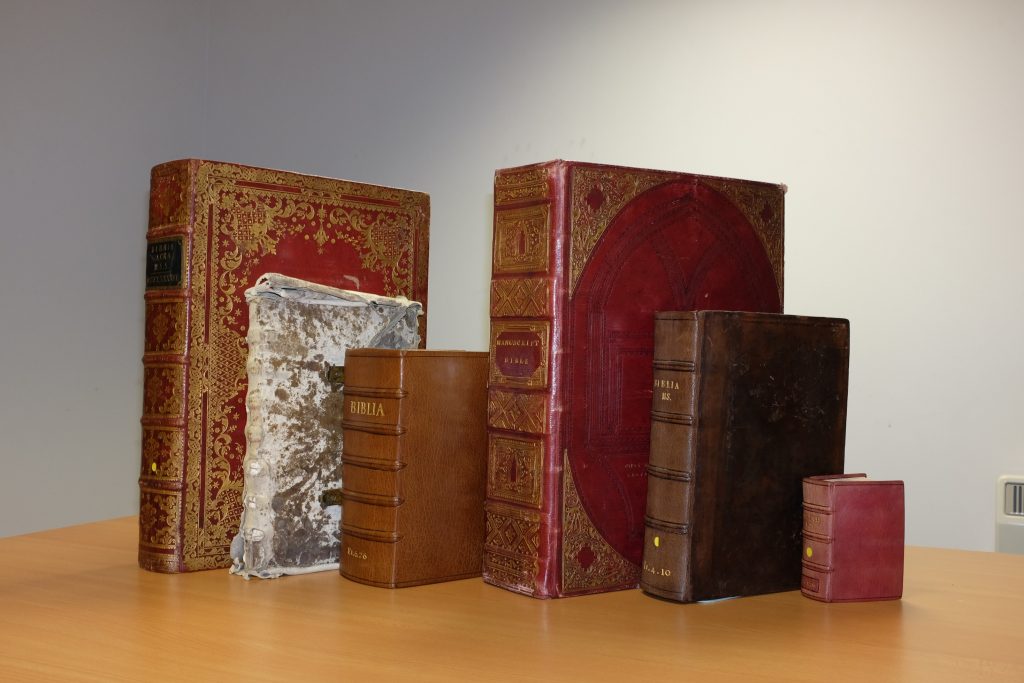Lectures: A material history of the Bible in England 1200-1600
A forthcoming public lecture series at Cambridge University Library:
A Material History of the Bible in England, 1200-1600
by Dr Eyal Poleg, Senior Lecturer in Material History (Queen Mary, University of London):
 From the rise of mass-produced Vulgates in the thirteenth century to the proliferation of innovative vernacular prints in the sixteenth, five lectures will chart the history of the Bible in England across print and reform. Manuscript and early printed bibles from the collections of Cambridge University Library will support a new history of the Bible in England, one which blurs the boundaries between reform and conservatism, and between the Church and heresy. Among their pages we will encounter a hidden portrait of Jane Seymour, the marks of scholars, children and crooks, and the discovery of America.
From the rise of mass-produced Vulgates in the thirteenth century to the proliferation of innovative vernacular prints in the sixteenth, five lectures will chart the history of the Bible in England across print and reform. Manuscript and early printed bibles from the collections of Cambridge University Library will support a new history of the Bible in England, one which blurs the boundaries between reform and conservatism, and between the Church and heresy. Among their pages we will encounter a hidden portrait of Jane Seymour, the marks of scholars, children and crooks, and the discovery of America.
Each lecture will be accompanied by a display of manuscripts and books from the Library’s collections and will be followed by a discussion led by a respondent.
22 May — The Late Medieval Bible: Beyond Innovation
29 May — Wycliffite Bibles and the Limits of Orthodoxy
5 June — 1535 and the First Two English Bibles
12 June — The Great Bible as a Useless Book
19 June — The Bibles of Edward VI and Beyond: Moving Fast Forward
Each lecture will take place at 5:30pm in the Milstein Room at Cambridge University Library. Lectures are free and open to everyone.

Will these lectures be offered on the internet via a live stream broadcast?
Dear Damon,
Thank you for your question. The lectures won’t be broadcast, I’m afraid, however their contents will ultimately be published by Dr Poleg in a new book with Oxford University Press (title tbc).
The Library is exploring the greater use of film as a means of disseminating the work that our curators, conservators and photographers do with the Special Collections, and of recording and broadcasting the lectures, talks and events that take place here – so watch this space!
James Freeman
Medieval Manuscripts Specialist
Mr. Freeman,
Greetings from Austin, Texas, USA. I applaud your investigation into the greater use of film, and of recording and broadcasting for the dissemination of the fruits of labor of the Library. Students and scholars (worldwide, when appropriate) will benefit this proposed font of knowledge.
With greatest respect, I mention the populations of persons with special needs will benefit as well if the proper web accessibility features are addressed in tandem with any dissemination; instead of being “an afterthought” or forgotten altogether.
I worked for more than 12 years a major University in Austin (we have a Gutenberg) that was, until recently, woefully lacking in addressing this population. However with more than 600 years in leading academia, I am certain Cambridge will continue in excellence with this endeavour as well.
I thank you for your scholarship and care.
Matthew